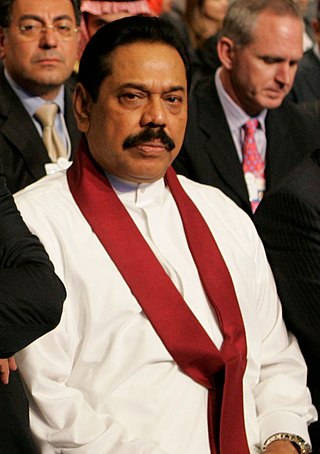
The 1835 United Kingdom general election was called when Parliament was dissolved on 29 December 1834. Polling took place between 6 January and 6 February 1835, and the results saw Robert Peel's Conservatives make large gains from their low of the 1832 election, but the Whigs maintained a large majority.

General elections were held in Malaysia on Sunday, 21 March 2004. Voting took place in all 219 parliamentary constituencies, each electing one Member of Parliament to the Dewan Rakyat, the dominant house of Parliament. They were the first elections for Abdullah Ahmad Badawi as Prime Minister following his appointment in 2003. State elections also took place in 505 state constituencies in twelve of the thirteen states on the same day as Sabah took the first time election was parallel with the rest of Peninsular Malaysia.

The Popular Orthodox Rally or People's Orthodox Alarm, often abbreviated to LAOS (ΛΑ.Ο.Σ.) as a pun on the Greek word for people, is a Greek right-wing populist political party. It was founded by journalist Georgios Karatzaferis in 2000, a few months after he was expelled from the centre-right New Democracy. Today, the party is led by Nikolaos Salavrakos.

Laos elects a legislature nationally and the public also participates in the election of village heads. The National Assembly has 164 members, elected for five year terms.

The National Assembly is the unicameral parliament of Laos. The National Assembly meets in Vientiane.
The 1939 East Norfolk by-election was a parliamentary by-election held on 26 January 1939 for the British House of Commons constituency of East Norfolk.
The 1939 Fareham by-election was a parliamentary by-election held for the British House of Commons constituency of Fareham in Hampshire on 6 October 1939. The seat had become vacant when Sir Thomas Inskip, the constituency's Conservative Party Member of Parliament had been ennobled as Viscount Caldecote on 6 September and appointed as Lord Chancellor. Inskip had held the Fareham seat since a by-election in 1931.
The 1913 Newmarket by-election was a parliamentary by-election held on 16 May 1913 to fill a vacancy in the United Kingdom House of Commons for the Eastern or Newmarket Division of Cambridgeshire.

Parliamentary elections were held in Sri Lanka on 8 and 20 April 2010, to elect 225 members to Sri Lanka's 14th Parliament. 14,088,500 Sri Lankans were eligible to vote in the election at 11,102 polling stations. It was the first general election to be held in Sri Lanka following the conclusion of the civil war which lasted 26 years.

Parliamentary elections were held in Laos on 30 April 2011. The ruling Lao People's Revolutionary Party (LPRP) won 128 of the 132 seats in the National Assembly.

Parliamentary elections were held in Laos on 30 April 2006. The ruling Lao People's Revolutionary Party (LPRP) won 113 of the 115 seats in the sixth National Assembly.

Parliamentary elections were held in Laos on 24 February 2002. The ruling Lao People's Revolutionary Party (LPRP) won all 109 seats in the National Assembly.

Parliamentary elections were held in Laos on 20 December 1992. They were the first held since the adoption of a permanent constitution a year earlier.
The 1919 St Albans by-election was a parliamentary by-election held in England in December 1919 for the House of Commons constituency of St Albans in Hertfordshire.

Parliamentary elections were held in Laos on 26 March 1989, the first since 1972 and the first since the Communist takeover in 1975.

Parliamentary elections were held in Laos on 21 December 1997. A total of 159 candidates contested the 99 seats, all but four of which were Lao People's Revolutionary Party members. All candidates were pre-screened by the LPRP. The LPRP won 98 seats, with an independent winning the remaining seat. Voter turnout was reported to be 99.4%.

General elections were held in Singapore on 23 December 1980. The result was a victory for the People's Action Party, which won all 75 seats, the last of four consecutive elections in which they repeated the feat. Voter turnout was 95.5%, although this figure represents the turnout in the 38 constituencies to be contested, with PAP candidates earning walkovers in the other 37. 685,141 voters out of the total electorate of 1,290,426 went to vote on the elections.
The Chorley by-election was a Parliamentary by-election. It returned one Member of Parliament (MP) to the House of Commons of the United Kingdom, elected by the first past the post voting system. Although it was a safe Unionist seat which was held, the reduction in the Unionist majority was notable.

Parliamentary elections were held in Laos on 20 March 2016. Voters were presented with a single list from the Lao Front for National Construction, dominated by the Communist Lao People's Revolutionary Party (LRPP). The LPRP won 144 of the 149 seats, with pro-government independents winning the remaining five.

Parliamentary elections were held in Laos on 21 February 2021 to elect the members of the ninth National Assembly. Provincial elections took place simultaneously.







